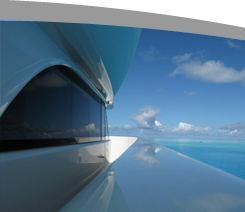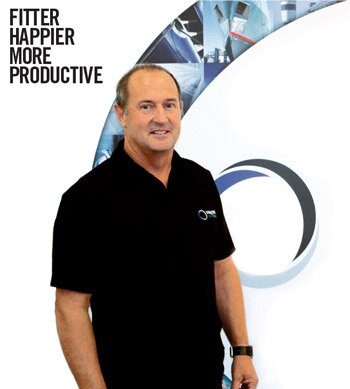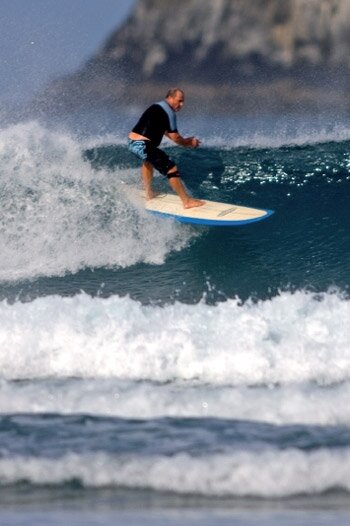

Mark Wightman - as published in Ocean Magazine.
Faced with economic storms, a remote location and stiff competition from its Australian neighbours, New Zealand’s maritime industry has consistently punched above its weight. Mark Wightman, CEO of Auckland-based superyacht refitter Integrated Marine Group and chairman of NZ Marine, spoke to Ocean about his personal involvement in yachting and New Zealand’s thriving marine industry.
Mark, you have been in the marine industry for 26 years. How did you get to where you are today?
I originally wanted to be a naval architect or boatbuilder, but openings were very hard to come by back then so I studied engineering. In 1978 I joined the Navy’s apprentice training program as a fitter and turner, which offered an excellent balance of workshop experience and theory, as well as time at sea. From there I joined the merchant marine fleet, and worked on what at that time was the largest refrigerated container ship in the world. When I first saw the size of the engine room I thought I’d bitten off more than I could chew, but I learnt more in those years than probably any other stage of my career. I went from there to a job in robotics, but really missed the sea. I joined the luxury yacht industry with Whiting Power Systems in 1993, and knew at once I had found my trade. This was about the time that large yachts started to arrive in Auckland for the first time.We have learned a lot and refined it to a well-polished program, and with every project you learn more. Some people think you can hang an “I do refits” sign above the door and expect to succeed in the industry, which is crazy when you consider what we have had to learn and the many potential pitfalls. And it’s not good for the industry. In 2003, following the second America’s Cup in Auckland, a team of us involved in refits for a long time saw a need to improve systems and processes to meet the increasing demand and complexity of the refit process, and formed Integrated Marine Group specifically with that in mind. We applied engineering disciplines to every part of our processes that has proved very successful. The one thing every job I have undertaken has offered is a wealth of experience overseas or with international clients that has certainly prepared me for the challenges in my business role and with NZ Marine.
Did you come from a boating family?
I’m from a farming background, but my mother’s family have a long boating history so when we did get a break from the farm we were usually on or near the water. I was always taken with the old clinker dinghy that we often fished from, and I raced keelers around Coromandel with my uncle and cousin. I asked for a model yacht when I was eight or so, and sailed it on every body of water I could find. A little later I built a canoe from some left over corrugated iron and some old timber, plugged the holes with bitumen and put a home made sail on it. It broke all the safety rules, but it was a lot of fun. Then when my schoolmates were buying Holdens and Zephyrs, I bought a Laser. That raised some eyebrows. By this stage we lived close to Lake Karapiro, which meant I got plenty of practice on the water in some very fluky conditions. If there was any doubt before by this stage I knew that I had to do some job that involved the sea. All my school projects where I had any leeway were on something yachting based. I subscribed to Seaspray from quite an early age which kept me up to play with the marine scene; who were the gun designers; the fastest yachts and most innovative crafts. I recall going to Auckland to watch the 18 footers race in a classic trans-Tasman battle, but noted a windsurfer screaming across the harbour when they were just new to the scene. I just had to have one of those and bought one immediately, 33 years later I am still doing it, although not so often now.
Aside from refits and crew support are there any other services IMG offers?
We started as a dedicated refit group in 2003, then in 2006 introduced yacht support to our services. We also provide crew placement / recruitment services, so it’s a pretty unique set-up. We provide ongoing yacht support for the client, not just during refit and repair. We aim to take as many of the headaches away as possible and make the client’s yachting time the enjoyable experience it should be. You can’t do that by offering only half a service.
How important for a crew to be comfortable while in port?
That’s a high priority, their job is harder than most people appreciate and time to recharge is a rarity for them. It is important to welcome them and make them feel part of the family. There is so much to do outside their normal workday here in New Zealand, and we make an effort to help them enjoy themselves.
What area of your work are you most passionate about?
I am very passionate about developing a team that can cover all the bases. A good team is everything. Delivering a quality refit that you’re proud of, and striving to be better and better each time is something I put a lot of energy into. Also very satisfying is seeing our Yacht Support team solve a difficult problem to keep a yacht’s program on track.
How do you balance your role as the Director of NZ Marine with your work at IMG?
NZ Marine Export Group is the export arm of New Zealand’s Marine Industry (formerly MAREX). It represents a wide range of exporters – boatbuilders, manufacturers and service providers. My role as Director is voluntary, and I have to thank IMG’s Board for recognising that something must be put back into the industry for it to grow. Doing the two jobs would be much more difficult without their support. There is a tremendous amount of voluntary time put in by so many people from our industry. That passion and belief is what sets our industry apart.
Has the NZ marine industry changed much in the 10 years since the America’s Cup?
New Zealand had the spotlight put on it and rose to the occasion. As an industry we learned a lot and grew a lot more professional in the way we operate. We’re still seeing the rewards now, although that’s not all down to the America’s Cup.
How has NZ faired during the economic decline, and what’s the outlook for the years ahead?
New Zealand enjoys a robust reputation in the global marine sector. We are very remote which makes it hard in tough times but compared to other markets NZ has faired remarkably well. We have retained our skills base and companies have become sharper, and with the proposed developments and our outstanding apprentice training scheme, I see great things ahead.
What benefits would new developments like Yard 37 at Hobsonville and Wynyard Project at the Viaduct bring to NZ?
Limited infrastructure has been a barrier to our industry here in the past, and these schemes – as well as those in Whangarei and Tauranga – would change that. Provided it is still driven by NZ companies the economic benefits to the economy will be tremendous over the longer term. We certainly have the skills and experience to make it work.
Could the yachting industries of NZ & Australia work better together?
Instead of seeing each other as competitors we need to focus on a collective strategy where we both win. There’s no overnight solution but if both industries are smart it could happen over time. It would help to promote regions to specific markets – for example superyachts, racing or charters. Maybe even advertise outside traditional yachting media to attract new players. We both have a fantastic tourism story to tell.
How do you convince European and US clients to make the trip down under for a refit?
12,000km is a long way to travel for a refit, but once you consider that you can enjoy the best fishing, cruising, sailing and onshore activities in the world while you’re here, cruise Asia or the Pacific on the way, and all while the northern hemisphere is gripped in winter – then it becomes a no-brainer. Clients come here and swim, fish, ski, spend a couple of nights at a high country lodge and then hours later they are back on board. We need to communicate this better, as people often say they wish they’d allowed more time here, as there is so much to do.
NZ yards have remained busy while a lot of overseas yards have been struggling. Why is that?
Experience, constant refinement of the product and attention to quality and reliability. The cost of labour in New Zealand versus the skill level and versatility of talent has also proved advantageous.






































